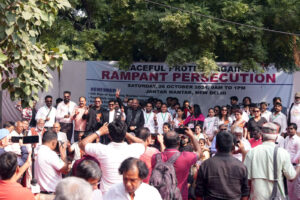
JACKSON, Tenn. (BP)–Beginning with his first publication in 1947, “The Uneasy Conscience of Modern Fundamentalism,” the 50 books authored or edited by Carl F.H. Henry, who died Dec. 7, have called for serious engagement with our culture and the issues of our day.
Henry’s irenic spirit enabled him to interact with others in an accepting way while holding unapologetically to the truthfulness of historic Christianity. The multiple volumes of essays, reference books and other resources that came from his pen represent some of the very best examples of what is called “the evangelical mind.”
Three key aspects of “the evangelical mind” can be described as:
1. Evangelicalism must not be “anti-intellectual” but rather must be engaging. It must emphasize the importance of the life of the mind, learning to think Christianly. Evangelicals contend that there is a place for rigorous academics, that truth counts, and that there is indeed a historic faithful orthodoxy to be confessed and proclaimed.
2. Evangelicalism must not be only “other worldly,” but must remain culturally engaged. It must stress the development of a Christian worldview, active service and global evangelism. Just as Henry, in his day, challenged the views of communism and fascism, so must evangelicals of the 21st century address the varied issues of our day in a similar way. Yet, Henry was quick to remind us that such engagement cannot be only “this worldly” either, for service by itself, apart from the Gospel, while certainly helpful, is ultimately insufficient.
3. Evangelicalism must not be “separatistic/legalistic/fundamentalist.” It must be involved and cooperative in educational and mission efforts. Indeed there must be an emphasis on cooperation in mission and a shared core of beliefs, coupled with an emphasis on purity, holiness and faithful Christian living. Evangelicalism at its best is characterized as having an irenic and hopeful spirit.
His magnum opus, the six volumes of “God, Revelation and Authority,” which best represents this “evangelical mind,” framed the issues of truth, authority and hermeneutics in a way that will enable the faith once for all delivered to the saints (Jude 3) to be passed on to yet another generation.
In 1989 Henry co-chaired the Evangelical Affirmations Conference. He served as scholar at large for World Vision and Prison Fellowship. For years he was affiliated with the Southern Baptist Convention and was still a member of the Capitol Hill Baptist Church in Washington, D.C., though his most significant involvements were outside denominational life. He served as president of the American Theological Society and the Evangelical Theological Society. Henry delivered many of the most prestigious academic lectureships in the world, including the University of Edinburgh’s famous Rutherford Lectures.
The work of Carl Henry as editor and author only tell a portion of the story. Through his presence and leadership at key events of the last 50 years, catalogued by others as well as in his own autobiographical reflections, Henry’s influence has been immense. Not only by his public writings but also through his prolific correspondence and mentoring of young leaders, he has shaped a generation to think Christianly about all of life.
On a personal note, it has been my privilege, like many others, over the past years to be the recipient of many of those instructive letters. His penetrating insights into matters of culture and society have provided the intellectual muscle to wrestle with the issues of modernity and post-modernity as well. Those who knew Carl F.H. Henry well knew him as a devout believer and faithful disciple of Jesus Christ. Those who met him for the first time often stood in awe of his giant intellect. But soon, almost without exception, they became more impressed with his humility and gracious spirit.
The Council for Christian Colleges and Universities (CCCU) annually awards the Carl F.H. Henry Scholarship to a journalism student who can bring a biblical perspective to the issues of our day. That biblical worldview has been the driving force in Henry’s work as exemplified in his quote in Who’s Who in America, which says, “The Bible remains the world’s most indispensable reading, and a personal walk with God remains our unsurpassable privilege. All the valid assumptions about the meaning and worth of life and about a just society flow from this.” In 2000, the CCCU awarded Henry their prestigious Hatfield Award for his leadership in behalf of Christian higher education.
Few people in the 20th century have done more to articulate the importance of a coherent Christian world and life view, the foundation stone for Christian higher education. No Christian college or university in North America carries forth the commitment to the integration of faith and learning without Henry’s influence, even if many on our campuses are unaware of that influence.
Carl F.H. Henry, an evangelical giant, will certainly be missed. But today we celebrate his life and his many contributions with thanksgiving to our great God.
–30–
David Dockery is president of Union University, a Baptist-affiliated university in Jackson, Tenn.












